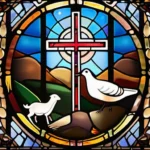Explore the core beliefs, history, and practices of the Church of Christ in this comprehensive guide.
The Church of Christ is a significant denomination within Christianity. In this article, we delve into its origins, key beliefs, and unique practices that set it apart from other Christian denominations.
The Origins and History of the Church of Christ
The Church of Christ, a Christian denomination that traces its origins back to the early days of the New Testament, has a rich and complex history. As we delve into its beginnings, we can’t help but wonder how a small group of believers in Jerusalem grew into a worldwide movement.
Imagine a single seed planted in the fertile soil of first-century Palestine; over centuries, it sprouted, branched out, and spread far beyond its original boundaries. This is the story of the Church of Christ.
The roots of the Church of Christ can be found in the teachings of Jesus Christ as recorded in the Gospels. How did His followers understand His message? Were they a new religious sect or simply Jews who followed Jesus’ way of life? The early Christians, including those described by the apostle Paul in his letters, held to a strict interpretation of Jesus’ teachings and sought to live them out in their communities. They believed in the unity of the church and practiced fellowship based on mutual love and respect.
The expansion of Christianity into other regions, such as Rome, saw further development. The Church of Christ, while maintaining its core beliefs, began to adopt practices influenced by local customs and traditions. Yet, despite this diversity, a common thread remained: their commitment to the simple gospel—that Jesus is the Son of God who died for our sins and rose again.
The centuries that followed brought both challenges and growth. The Roman Empire’s influence led to the persecution of Christians, but also to the spread of Christianity through missionary work. As the Church of Christ grew, it encountered various heresies and faced theological disputes, which further defined its beliefs and practices. Throughout these trials, the Church of Christ remained steadfast in its commitment to Biblical principles, seeking to maintain purity and truth.
Today, as we look back on this journey, we see a denomination that has preserved much from its early days while also evolving with time. Understanding the origins and history of the Church of Christ is not just about learning a piece of history; it’s about grasping the dynamic nature of faith and community over millennia.
Key Beliefs and Teachings of the Church of Christ
When exploring the core beliefs of the Church of Christ, one might wonder: what exactly sets this denomination apart from others? The Church of Christ places a strong emphasis on biblical simplicity and practical application. Let’s delve into some key teachings that define its ethos.
Salvation: For those curious about the path to salvation, the Church of Christ offers a straightforward yet profound answer. They believe in justification by faith alone, much like the early Christians did. However, they also stress works as an expression of one’s faith, ensuring that belief is not just intellectual but also practical and tangible.
In this sense, salvation isn’t seen merely as a once-and-done transaction but as a continuous journey marked by adherence to Christ’s teachings in daily life. The metaphor of biblical living often comes into play, illustrating how one’s actions should mirror their faith just like the branches of a tree bear fruit.
Baptism: Another central tenet is baptism. The Church of Christ views baptism as an essential step for new believers, not merely symbolic but a physical act of commitment. Through baptism by immersion, individuals publicly declare their faith and dedication to Christ, much like planting a seed in fertile soil that promises growth and life.
The Lord’s Supper: Similarly, the observance of The Lord’s Supper (Communion) is deeply significant. It serves as both a commemoration of Christ’s sacrifice and an act of fellowship among believers. This practice reinforces unity within the church community, emphasizing that we are all part of one body in Christ, much like cells working together to form a living organism.
Understanding these beliefs helps us grasp the Church of Christ’s commitment to living out their faith in a meaningful way. Whether through acts of worship or daily interactions, their teachings guide members towards a life centered on loving God and loving others.
The Role of the Bible in the Church of Christ
The Bible plays a central role in the Church of Christ, much like the heart pumps blood through our veins. How do they interpret and use this ancient text? The Church of Christ views the Bible as their ultimate authority, just as Moses viewed the tablets of stone given by God on Mount Sinai.
How can such an ancient book guide us in today’s world?
Their approach to scripture is akin to diving into a vast ocean—carefully sifting through its depths for pearls of wisdom. They emphasize the literal and historical-grammatical method, seeking to understand each passage in its original context. This ensures that their interpretations are rooted in the original intent of the text rather than modern cultural biases.
Moreover, they believe in the dynamic inspiration of the Bible, which means they see it as a living document that speaks to every generation. It’s not just a collection of ancient laws and stories; it’s a guidebook for life, filled with principles applicable to every situation.
Could it be that each page holds a new revelation for us today?
The application of biblical teachings is another critical aspect. They advocate for living out the commandments and teachings as they were meant to be understood in their original context. This practical approach turns abstract doctrines into actionable faith, much like turning raw ingredients into a sumptuous meal.
Through this lens, the Church of Christ strives to build a community that reflects the love, forgiveness, and justice found within its pages. It’s not just about reading or believing; it’s about embodying these values in every interaction, making their faith tangible in the world around them.
Could your life be transformed by living out the teachings of the Bible?
Understanding how the Church of Christ interprets and applies the Bible is crucial for grasping its unique identity. It’s more than just a book; it’s a lifeline, guiding every aspect of their lives with love and conviction.
Unique Practices and Traditions of the Church of Christ
When delving into the unique practices and traditions of the Church of Christ, one can’t help but wonder how they differ from other Christian denominations. After all, every church has its own distinct flavor, much like a spice blend in a kitchen cabinet – each with its special mix that sets it apart.
One of the most striking aspects is the absence of paid clergy. In many congregations, serving as an elder or pastor is seen more as a calling than a career. Imagine the church as a garden where everyone contributes their hands to tend and care for the plants. While some churches have professional pastors with advanced degrees, in the Church of Christ, these roles are often filled by laypeople who volunteer their time and talents.
The practice of foot washing is another intriguing tradition. This ritual serves as a powerful reminder of humility and service. It’s as if each foot represents a different member of the community, and through this act, members symbolically clean one another’s feet, demonstrating their commitment to mutual care and respect. Could there be a more tangible way to embody Jesus’ words about servant leadership?
Then there’s the use of contemporary music in worship services. While some churches might stick with traditional hymns, many Churches of Christ embrace modern praise songs that speak directly to the heart. It’s like finding a new language to express timeless truths – vibrant and relevant, yet deeply rooted in faith.
The Church of Christ also places a strong emphasis on mission work and humanitarian efforts. From local community service projects to international relief missions, their actions often mirror the spirit of St. Francis of Assisi, who preached through his deeds as much as his words. This holistic approach to faith shows that belief isn’t just about individual salvation; it’s also about making a difference in the world.
In exploring these unique practices, we see a church that values community, humility, and service above all else. Each tradition is like a puzzle piece, fitting together to create a vibrant tapestry of shared faith and purpose.
The Church of Christ Today: Growth and Challenges
How does the Church of Christ navigate its way through today’s complex and ever-evolving religious landscape? The Church of Christ, like any faith community, faces unique challenges while also experiencing significant growth. Let’s delve into these aspects to understand where this denomination stands now.
The Church of Christ has seen a remarkable expansion in recent years. How does it manage such growth without losing its core identity and values? One must wonder if the principles that defined the early Church are being upheld or if new challenges demand innovative solutions. With members spread across diverse geographical and cultural landscapes, how does the Church ensure unity and shared purpose amidst this diversity?
Challenges abound for the Church of Christ today. Economic pressures, social changes, and shifting societal norms all test its resilience. Yet, through these trials, the Church continues to find ways to serve and support its members. How does it balance traditional teachings with contemporary issues like gender equality, LGBTQ+ inclusion, and global outreach?
The future prospects of the Church of Christ are intriguing. Will it continue to grow as a voice for those seeking spiritual guidance in modern times? Or will new challenges lead to changes that might alter its character fundamentally? These questions resonate not only within the Church but also among scholars and observers of religious trends.
As we ponder these issues, one thing becomes clear: the Church of Christ’s journey is a testament to the enduring power of faith. It faces challenges head-on, adapting where necessary while holding tightly to its foundational beliefs. The future, as ever, lies in how well it can balance tradition and innovation, ensuring that its message resonates with new generations.
How will the Church of Christ respond to these challenges? Will it continue to thrive or face significant changes? Only time will tell, but one thing is certain: its story remains a fascinating chapter in the broader narrative of Christian denominations worldwide.
Frequently Asked Questions about the Church of Christ
Have you ever wondered what it means to be part of the Church of Christ? Many people ask, ‘What exactly do they believe?’ and ‘How does their history shape their beliefs today?’ Let’s delve into some frequently asked questions about this denomination.
Q: What are the core beliefs of the Church of Christ?
- The belief in one God who is a triune being: Father, Son, and Holy Spirit. This concept is central to their faith, much like the foundation of a house must be solid for it to stand firm.
- A strong emphasis on the importance of baptism as a means of salvation. They believe that immersion in water symbolizes a death to sin and a new life in Christ, similar to shedding old leaves so new ones can grow.
- The practice of communal worship, where every member is seen as an integral part of the body of Christ. It’s like a symphony orchestra, each person playing their part to create beautiful music together.
Q: How did the Church of Christ come about?
- The Church of Christ traces its roots back to the early church described in the New Testament. They believe that they are simply following the practices and teachings as outlined by the apostles, much like a treasure map leading you to a hidden chest.
- It emerged from various 19th-century revivals and reform movements. Think of it as a seed planted during times of great spiritual awakening, growing into a tree that bears fruit today.
Q: What practices are unique to the Church of Christ?
- Their practice of open communion, where anyone who professes faith in Jesus can participate. It’s like an open invitation party, everyone is welcome if they bring their heart and faith.
- The absence of paid clergy or a hierarchical structure. Instead, they believe that all members have spiritual gifts and responsibilities, much like a democracy where every voice counts equally.
These beliefs and practices make the Church of Christ unique yet deeply rooted in Christian tradition. Understanding these core elements can help clarify misconceptions and foster greater comprehension among those curious about this faith community.
Conclusion
 By understanding the history and beliefs of the Church of Christ, you will gain valuable insights into one of the world’s most influential religious movements.
By understanding the history and beliefs of the Church of Christ, you will gain valuable insights into one of the world’s most influential religious movements.











